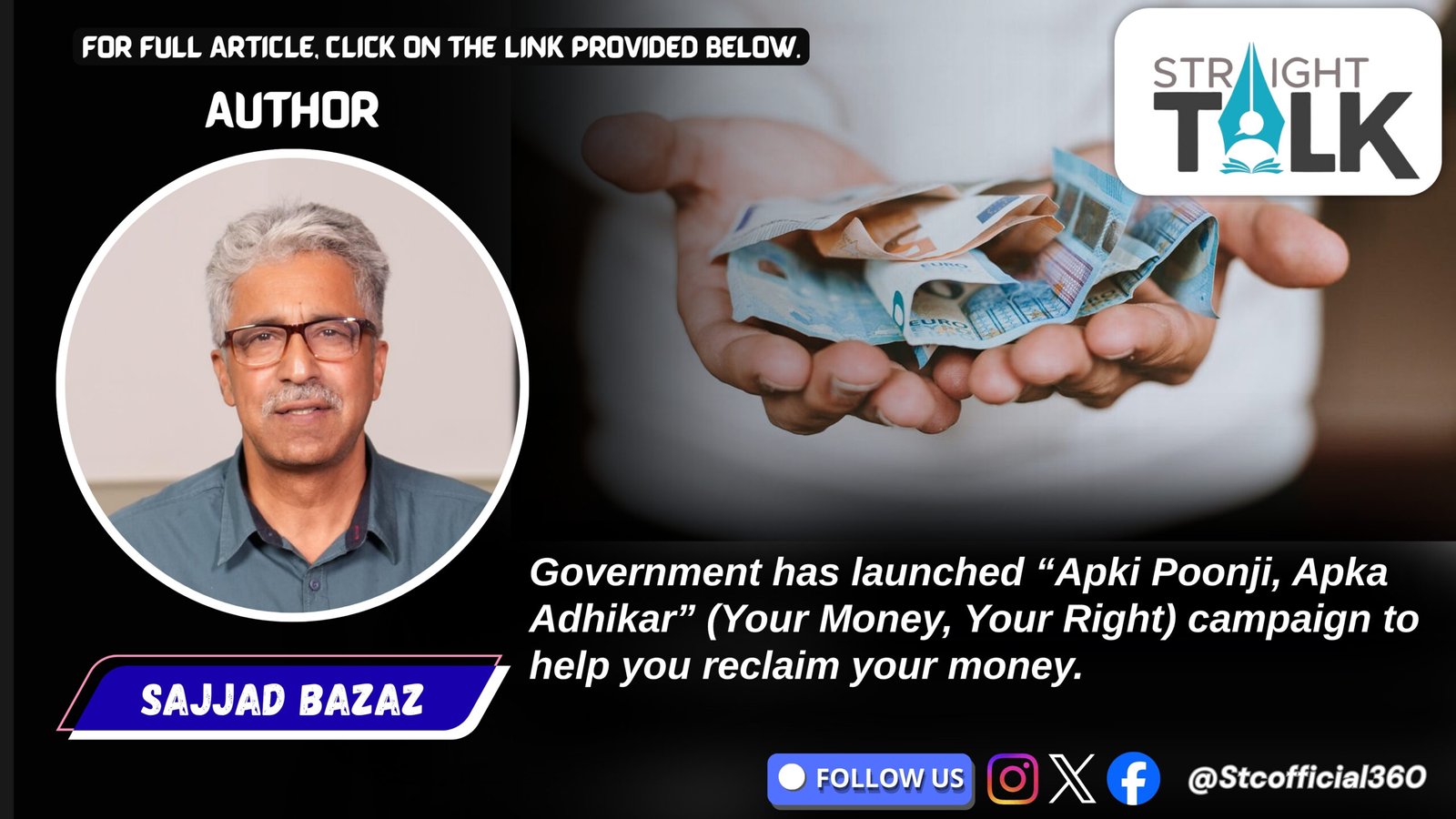Are you looking for details of the ‘missing’ deposit account?

Government has launched “Apki Poonji, Apka Adhikar” (Your Money, Your Right) campaign to help you reclaim your money.
Sajjad Bazaz
One of my acquaintances was shocked to see a team of bank officials at his doorstep. The team had stepped at his residence to trace the whereabouts of a ‘missing’ account holder. My acquaintance, assuming the ‘missing’ accountholder as a loan defaulter, told them that he was not his guarantor in any loan.
The bank officials sensing his confusion clarified that they were looking for the ‘missing’ accountholder to claim the balance amount in his savings bank account left unattended for years together. The bank officials also told him that he being the introducer to his savings bank account made a sense for them to seek information about the ‘missing’ account holder’s whereabouts. Relieved of the tension, my acquaintance guided them about his exact place of residence.
The basic reason to share this small but significant story is that financial assets worth a whopping amount of Rs 1.84 lakh crore are lying unclaimed with banks, Reserve Bank of India (RBI) and IEPF (Investor Education and Protection Fund). Even as the government has been making consistent efforts at regular intervals to make rightful owners of the unclaimed deposit accounts reclaim their balance, the amount in such accounts only swells.
Now, just a few days back, Union Finance Minister Nirmala Sitharaman launched the three-month “Apki Poonji, Apka Adhikar” (Your Money, Your Right) campaign and asked the concerned officials to focus on “Awareness, Access and Action” to help citizens reclaim their money.
“Unclaimed monies are lying with the banks or with the RBI or with the IEPF (Investor Education and Protection Fund). We have to find the rightful owners and claimants of those funds and hand the money over to them,” Nirmala Sitharaman said.
She assured that the money is secure. “As per the DFS (Department of Financial Services), Rs 1,84,000 crore is lying there. It is safe. I can assure you it is absolutely safe. You come when you want with proper papers. Money will be given to you. The government is the custodian for it,” Sitharaman said.
It’s pertinent to mention that in the year 2023, the Reserve Bank of India (RBI) on June 1, 2023 had launched a special 100 days campaign under which banks were asked to trace and settle their top 100 deposits in every district of the country. Even as there are standing instructions for the banks to find the whereabouts of the missing customers and their legal heirs to help them to claim the amount in their unclaimed accounts, the performance of banks in bringing down the volume of unclaimed deposits has been dismal and the RBI has been showing its displeasure time and again that banks are not active enough in settling the unclaimed deposit accounts.
Now the Central government’s campaign under “Apki Poonji, Apka Adhikar” (Your Money, Your Right) is yet another opportunity for banks to trace and settle the unclaimed deposits. This initiative will reduce the quantum of unclaimed deposits in the banking system and return such deposits to their rightful owners/claimants.
Meanwhile, there are certain issues which a deposit accountholders are supposed to know and keep track of their monies deposited in their accounts.
What is an inoperative account or dormant account?
As per Reserve Bank of India (RBI) guidelines, a savings bank account, and even a current account, is considered dormant or inoperative if there are no transactions in it for at least two years. Inoperative accounts with banks also include term deposits, recurring accounts, various forms of transfers such as telegraphic or mail, demand drafts, pay orders, bankers cheques, unadjusted National Electronic Fund Transfer (NEFT) balances, among others.
After the account remains inoperative for one year, the banks have to explore the possibility of contacting the account holder either through post or telephone to ascertain the reason for not conducting transactions in his account. If the customer cannot be traced, the bank has to contact the introducer or nominee of the account. If the account holder still remains untraced for another year, the account has to be termed inoperative. Once the account falls in the inoperative category, the account holder cannot operate it before complying with certain mandatory formalities.
What is an unclaimed account?
If a bank account remains inoperative for a period of 10 years, the account is categorized as an unclaimed account. The money in this account is called unclaimed money. As per the RBI guidelines, the unclaimed money can be transferred to Depositors Education and Awareness Fund (DEAF).
What is the Depositor Education and Awareness Fund (DEAF) Scheme and how is it linked to the unclaimed deposits?
Even as the RBI has directed all banks to take proactive measures to trace owners of the unclaimed deposit accounts, the Government of India in March 2014 empowered the Reserve Bank of India (RBI) to establish a Fund under the Depositor Education and Awareness Fund Scheme, 2014 by inserting section 26A in the Banking Regulation Act, 1949. On May 24, 2014, the RBI notified the establishment of the DEA Fund in the Official Gazette.
As per this amendment, all banks are required to transfer money lying in accounts that have been inoperative for at least 10 years to the Fund. In fact, banks have to list out inoperative accounts every month and transfer funds lying in these, along with interest accrued, by the end of the subsequent month.
Notably, the unclaimed money is to be transferred to this fund within 3 months from the expiry of 10 years.
How is this unclaimed money parked under the DEAF Scheme utilized?
The money transferred to the fund by various banks is invested in instruments such as government securities by a committee set up by the RBI. The income thus earned is used for paying interest on the deposits as well as using it for investor awareness and education purposes.The educational initiatives for customers could include information sharing seminars or research projects related to banking practices.
How can a customer know about his unclaimed money and what’s the procedure of claiming it?
Every bank is required to show the details of unclaimed accounts on the bank’s website. Notably, the RBI has also a centralised web portal where you can search for unclaimed deposits. The portal helps users to search for their unclaimed deposits across multiple banks by providing personal details like name, PAN, or date of birth. After searching, users can initiate a claim with their respective bank.
After checking the details on the website, you can visit the bank branch with a duly filled claim form, receipts of the deposits and know your customer (KYC) documents to claim the money.
If you are the claimant, you need to visit the branch. Earlier, you would have had to go to the particular branch with which you had made the deposit but now with core banking, you can approach any branch. However, if the claim is related to an old account (when digital banking was not enabled), it is advisable to visit your home branch.
If you are the legal heir or nominee, you need to approach the bank with the deposit receipts, identity proof and a copy of the death certificate of the account holder. After verifying the genuineness of the claim, the bank will release the payment.
According to the Reserve Bank of India (RBI) guidelines if there are no transactions in the account for a period over two years, it is to be treated as dormant or inoperative. However, there is a hassle free mechanism in place for such account holders to make their dormant accounts (accounts declared inoperative by the bank) operational.
(Sajjad Bazaz is Editor-in-Chief at Straight Talk Communications. He has over 35 years of experience in Banking and finance. He is former Head of Corporate Communications & CSR Department and Internal Communication & Knowledge Management Department, Jammu & Kashmir Bank)







